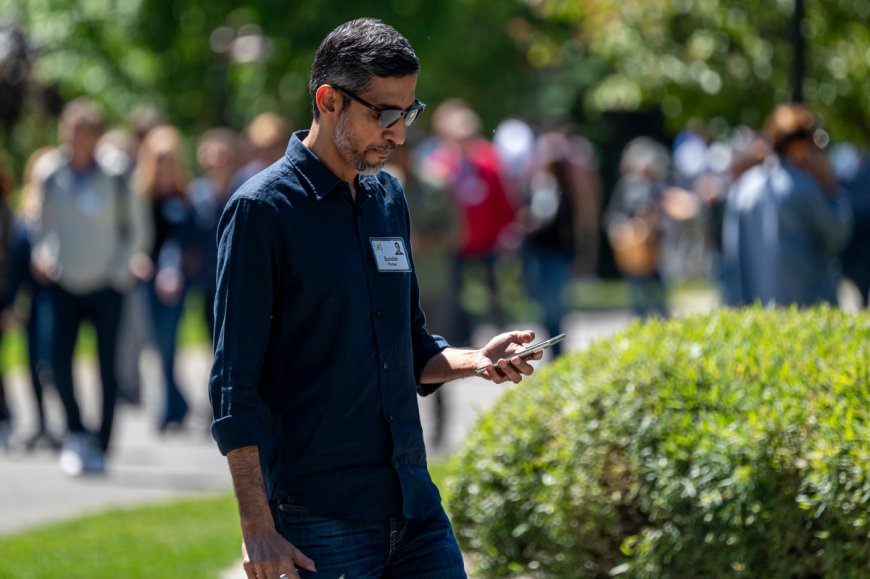Expert explains why Google's anti-monopoly trial is unnecessary
The Department of Justice will lay out its anti-monopoly case against Google, and parent company Alphabet, on Tuesday.

The trial for the U.S. Department of Justice's anti-monopoly case against Google is set to begin Sept. 12. The DOJ will spend the next few months laying out exactly how the tech giant allegedly violated U.S. anti-monopoly law in signing deals that made its search engine the default for a wide swath of internet users.
Google (GOOG) - Get Free Report meanwhile will be working to prove that its actions as the dominant search engine — its share of the search engine market has been parked at around 90% for the past year, according to data from Similarweb — are not anti-competitive.
Related: Elon Musk says SpaceX Starship is ready to launch; regulators don't agree
Yuri Khodjamirian, the chief investment officer at Tema ETFs, manages the firm's Monopolies and Oligopolies ETF. And he doesn't think the tech sector can actually produce durable monopolies.
Anti-trust cases in tech exist against the backdrop of something that is "constantly changing and evolving," Khodjamirian told TheStreet. "Anti-trust authorities are having to fight cases on markets that don't exist yet."
For Khodjamirian, the tech sector is too fast-paced for any company to ever be truly dominant.
"In 30 years time, the railroads that exist in America are going to be the same railroad that exists today," he said. "Will we be using GPUs from Nvidia (NVDA) - Get Free Report, who knows? But there's definitely competitive threats." 
Khodjamirian has a series of five aspects he looks at in determining whether a company has enough competitive advantage to be considered a monopoly: network effects, high switching costs, economies of scale, regulation, and non-replicable physical assets.
While increased network size can create a monopoly, they are also prone to disruption, Khodjamirian said, citing the fact that TikTok bought around a quarter of all ads seen on U.S. Apple devices on the Facebook network in 2018. Now, TikTok is an enormous platform outside of the purview of Meta (META) - Get Free Report.
More Artificial Intelligence:
- Even regulation won't stop data scraping from AI companies, Quivr founder warns
- Experts explain the issues with Elon Musk's AI safety plan
- US expert warns of one overlooked AI risk
Switching costs, Khodjamirian said, are likewise not a potent force in the creation of a tech monopoly. Disruption happens too often for that to be the case (the dominance of MySpace, iTunes and Nokia was erased by Facebook, Spotify and Apple).
And because many companies' business models, especially in the tech sector, are focusing on the monetization of their users through advertising, there is no such thing as true scale, Khodjamirian said. All these companies, from Uber (UBER) - Get Free Report to Amazon (AMZN) - Get Free Report, are competing for the same hours of attention from their users. This convergence toward advertising makes it difficult for any one company to be truly dominant — there are only so many advertisers and advertising dollars out there.
The only area that represents a pathway to monopoly, to Khodjamirian, is in non-replicable physical assets, which in the tech sector, could be anything from specialized tax services to semiconductor chip manufacturing materials.
"In the case of Google, you definitely have some monopolistic power within search, but in my view, there is a major competitive threat now to search through AI," Khodjamirian said. "At some point, this is going to affect Google's business. It hasn't yet, but it will. You have a competitive threat."
This threat of coming disruption in a sector that is historically disruptive is enough for Khodjamirian to question the merit of presenting an anti-trust case against Google at all.
"The competition law is very backwards-looking," he said. "The technologies are forward-looking. So it's very difficult to find a case about a market that's evolving so quickly."
If you work for Google, contact Ian by email [email protected] or Signal 732-804-1223
Get investment guidance from trusted portfolio managers without the management fees. Sign up for Action Alerts PLUS now.
What's Your Reaction?



























































